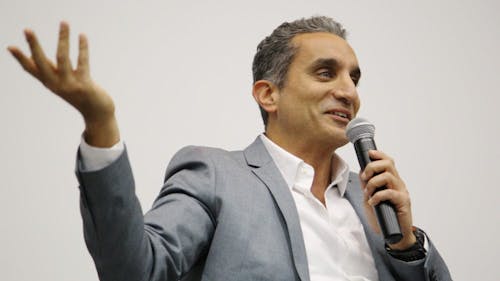Arab Cultural Club hosts television personality Bassem Youssef for special screening of his documentary

Nearly 400 members of the Rutgers community turned out to hear Egyptian television personality and comedian Bassem Youssef discuss hosting a satire talk show during a time of political upheaval in the Middle East.
Youssef was hosted by the Arab Cultural Club in the Cook Student Center on Wednesday night. His presentation intended to inform guests about his experiences advocating for free speech, and to discuss his new documentary “Tickling Giants,” which explored the history of his comedy show.
“He’s just such an inspiration and I just know he is an inspiration to my friends as well, almost a quarter of the Egyptian population used to watch his show in cafes — it wasn’t just a show, it was an event,” said <g style="background-color: initial; font-size: 14px; color: rgb(51, 51, 51);">Nourin</g> Abubaker, president of the Arab Cultural Club and a School of Arts and Sciences senior. “We had to turn down a lot of people because we’d reached capacity and we weren’t able to sell more tickets.”
Youssef, who was originally a heart surgeon, began satirizing Egyptian news programs and the government after the Egyptian Revolution in 2011 with a YouTube show. A national television network picked him up, creating “Al Bernameg," “The Show," later that year. The comedian continued the program with three different networks until he was forced off the air by political pressure.
In 2014, Youssef left Egypt after a court ruled he owed 100 million Egyptian Pounds to one of his former networks for contract violations.
The documentary’s director, Sara Taksler, began the project in 2012, visiting Youssef in Egypt while his show was still on the air. She said the purpose behind “Tickling Giants” is to launch a conversation about how individuals can stop the abuse of power, whether it is at a local or national level.
While the protests which forced former Egyptian President Hosni Mubarak to resign and the coup which overthrew former President Mohamed Morsi are vastly different from the protests against the United States President Donald J. Trump, there are common signs with both, she said.
“Egypt and America are very different countries with very different histories, and the U.S. is lucky to have a long history of free speech which is valued by people all over the political spectrum,” she said. “But if you watch ‘Tickling Giants’ and don’t see some warning signs, I don’t know what movie you’re watching, because, to me, there are a lot of very loud hints that we are on a path where power is being abused and free speech is being limited.”
Abubaker said the United States’ legal protections make protests within America different from those in Egypt.
Media outlets in Egypt are heavily censored, and Youssef’s program was the first to criticize the government, she said. Abubaker lived in Egypt in 2013, near the time of the military coup.
“I feel there is definitely a similarity in people rising against something they believe in and voicing their opinion, but it is a very different context,” she said. “In one place it’s organized, it’s safe, there’s police, in the other people could lose their lives. We have a judicial system — I think that’s the hardest part in comparing the protests, we have law and justice.”
Taksler said Youssef’s method for making his voice heard differs sharply from protestors and may have been more effective because it was able to reach more people.
“The thing that I find interesting in Bassem’s story is a few blocks away in Tahrir Square, people were killing each other to have their opinions heard, and by telling a few jokes, Bassem had a much louder voice,” Taksler said. “Yelling and screaming and fighting might feel necessary, but I don’t think that will change things. If people can find a funny sign, to me, that’ll read louder.”
The movie has been positively received so far, she said.
“One thing that’s really been hopeful to me, the movie has resonated not just with liberals, but with conservatives and libertarians and people with views different from my own,” Taksler said. “Because it is about a different country, it’s easier for people to not come up with their own political biases because they don’t know the history of the country really well.”
The Arab Cultural Club hosted Youssef as part of an educational event, Abubaker said.
The group is a non-political, non-religious organization which seeks to raise awareness of the culture of Middle Eastern countries, she said. They host various events through the year, including their annual street festival.
While they do not always host a speaker in the spring semester, Abubaker said it was important for the group’s members to do so this year to educate the community after the last election.
“With his show, which revolves around propaganda, fake news, all of that is very relevant to us in America today,” she said. “I think it was the perfect time to bring him – even if we brought him two years ago it wouldn’t have the same effect as it did today.”
Taksler said she hoped people who watched the movie would learn more about refugees from nations like Egypt — Youssef, along with most of the people in the documentary, are refugees, but they are still people.
“I (also) hope everyone who watched the movie tries to find their own creative, non-violent way to stop the abuse of power and fight for free speech,” Taksler said. “I never could have imagined that this movie would be so relevant to my own country. When I was making this, that never crossed my mind.”



